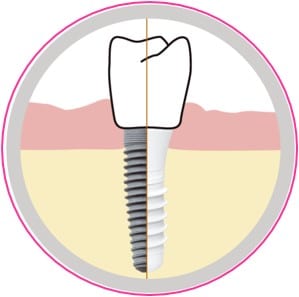Thanks to the latest technology and many years of experience, we can safely and firmly replace lost teeth with implants. So we can give you a radiant smile again, even with artificial teeth. Let us advise you personally and learn more about the possibility of dental implants.
When are dental implants used?
We use dental implants in implantology when a tooth is so badly damaged that it can no longer be preserved or there has been a gap for a long time. A restoration with a dental implant can, if used properly, replace a natural tooth in its function and appearance very faithfully.
What material is used in dental implants?
Dental implants today consist of pure zirconium oxide ceramic or high-purity titanium oxide. In addition to dental implants, the latter is also used for knee or hip prostheses.
Both materials are highly biocompatible, very resilient and extremely well tolerated for fixed dentures.
In our clinic in Switzerland we use the dental implants of the world market leaders Straumann and Nobel Biocare as well as the unique 2-part Zeramex all-ceramic system from the Zurich company Dentalpoint, Switzerland. As an implant manufacturer, Dentalpoint is a pioneer in the field of ceramic implants.
For all parts of the dental implant, the implant manufacturers give a replacement guarantee of at least 20 years on parts, so that a replacement with original parts can be guaranteed even in the event of an accident and damage to the implant components.
Further interesting information about our implant systems can be found below.

By loading the video, you accept YouTube's privacy policy.
read more
What are the costs of an implant?
The total cost of a dental implant, depending on the brand, location in the jaw, structure of the jawbone and bone situation, is between CHF 2900 and 5500. In addition, the price is also determined based on which implant system is used in the treatment. As a rule, a single implant can easily be made for CHF 2900-4000, depending on the implant system, if the bone supply is very good.
In addition, depending on the degree of degradation of the jawbone, bone quality and the patient's request, there may be:
- Costs for a temporary denture in the healing phase of the implant (not always necessary).
- Costs for bone augmentation if the existing, local bone is not dimensioned sufficiently strong for the primary stable insertion of the implant.
This then results in the total costs, which in principle can vary widely. However, in our practice in Zurich we offer implant systems in different price categories, so that an implant does not have to be reserved for a wish or treatment abroad.
Price examples single tooth implant
- Best Price: Medentis DaVinci implant (Straumann Bone-Level Analog) CHF 2990.-
- Best Value: Straumann Bone Level or Bone Level Tapered CHF 4290.-
- High end: Zeramex 2-part metal-free all-ceramic implant, CHF 4890.-
Make an appointment for a free consultation on implants today.
More about dental implants
Before an implant treatment can be carried out, some preliminary examinations and often preliminary treatments by the dentist are necessary. This is usually the case when several teeth or even a toothless jaw needs to be restored. Under certain conditions, dental implants can also be treated directly without the need for extensive preliminary examinations.
The course of treatment for dental implants includes the following points:
Preliminary examination of the fixed teeth, bone structure and the jawbone:
- Detailed examination of the patient's medical history and analysis of the missing teeth
- General examination of the jaw
- Take x-rays of the jaw and skull
- Advice on individual treatment options and dental implant systems
A healthy oral cavity and healthy gums are the conditions for high quality implantation and long-term success. Therefore, individual pre-treatment may be necessary in some cases.
Pretreatment of the damaged areas:
- Treatment of tooth decay
- Removal of tooth roots and teeth that are not worth preserving
- Care of the gums in case of periodontal disease
- Manufacture of a temporary denture
- Bone build-up in the case of bone loss for sufficient bone supply
- Planning the treatment of dental implants by implantology
The implantation of the new teeth:
- Local anesthesia
- Opening of the oral mucosa and insertion of the implant screw into the jaw
- Assemble a sealing cap for closed healing
- Impression taking for the fabrication of the temporary tooth crown
- Insertion of the temporary dentures
The best prerequisite for a successful implantation and a flawless treatment process is a healthy oral cavity. For this, in implantology, the dentist must have successfully treated the diseased teeth or inflammation of the tooth holding apparatus (periodontitis) before placing the implant. In order for the implant to heal without complications, the patient must ensure good oral hygiene.
Healing can also be impaired by too early or unexpected stress. This can be the case, for example, with unconscious teeth grinding or clenching (bruxism).
Other risk factors that can interfere with the healing of implants are general diseases such as poorly controlled diabetes. If there are general illnesses, you should therefore consult your family doctor closely.
Regular check-ups at the dentist are important after the implantation. In this way, the dentist can check whether the artificial tooth root is healing well. After about three months, the implant should be so firmly attached to the bone that it can be loaded. The dentist then uses various methods to take an impression of the jaw relationships. The impression or scan serves as a template for the dental technician to select a suitable shape for the implant post and then to manufacture the desired denture individually for the patient. The manufacture of implant-borne crowns, bridges and prostheses (superstructures) also requires special knowledge and skills as well as well-thought-out planning from the master dental laboratory.
It is important that the dentist and dental technician continue to coordinate closely even after the dentures have been incorporated. In particular, the fit of the removable dentures must be checked by the dentist. If the jawbone regresses and the prosthesis loses its original hold, the dentist takes a so-called relining impression, for example. The dental technician then adjusts the base of the prosthesis to the oral situation and restores the hold of the prosthesis. Further information can also be found on the website of the Swiss Implant Foundation.
Usually over 90 percent of artificial tooth roots heal successfully. However, smoking makes healing much more difficult. On average, the risk of losing a dental implant is twice as high for smokers than for non-smokers. The risk increases with increasing nicotine consumption. In heavy smokers, up to a third of the implants can be lost. This is due to the poorer wound healing caused by smoking. The risk of faster and more severe breakdown of the jawbone in the vicinity of implants is also significantly higher in smokers. The implant can be lost prematurely. Smokers should therefore renounce the blue haze even before an implant has to be placed.
Depending on the individual risk of disease, regular, professional tooth cleaning is of central importance for the success of an implantation. The dentist or a specially trained employee in our practice in the heart of Zurich shows the patient how to properly clean and care for implants as part of oral hygiene training. In particular, the transition between the implant and the gum must remain free of bacterial deposits. Otherwise there is a risk of peri-implantitis, an inflammation around the artificial tooth root. In the worst case, the dentist has to remove the implant again.
It is therefore important to clean the spaces between the teeth and the area around dental implants particularly intensively. Dental floss and special interdental brushes should be used daily.
"If the artificial dentures are not properly cared for, bacteria can adhere to the implant post, migrate down along it and cause inflammation of the gums," explains Prof. Dr. Hans-Christoph Lauer, Director of the Polyclinic for Dental Prosthetics at the University of Frankfurt am Main. “If the inflammation progresses, it can spread to the bones. Peri-implantitis develops. It is often worse and spreads faster than periodontitis on natural teeth. "
This is due to the structure of the implant. The connecting piece protruding from the gums is smooth and easy to clean for daily oral hygiene. However, the part anchored in the bone has threads and a rough surface. Once bacteria have penetrated this far, it is much more difficult to remove than from a natural tooth. Peri-implantitis should always be treated as early as possible. Without treatment, the implant can be lost. You can find more information on the website of the Society for Oral Implantology Switzerland.










